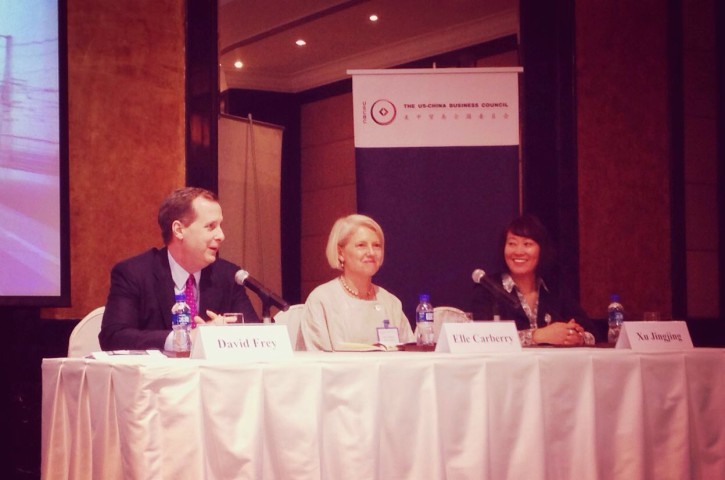
What opportunities and challenges do China’s ambitious urbanization plans hold? More than 100 million people will move to China’s cities in the next decade, even as China’s leaders strive to develop a more services-focused economy and get severe pollution under control. “We believe there does not have to be a trade-off between environmental and economic prosperity” as the urbanization process moves forward, said Elle Carberry, Paulson Institute Managing Director, and head of the Institute’s Climate Change & Air Quality Program. She was speaking on a panel in Beijing at the US-China Business Council’s annual meeting.
The panelists noted that China’s leaders are trying to promote more balanced urban development. “China is discouraging growth in megacities, somewhat discouraging growth in larger cities, tolerating it in medium sized cities… and very actively encouraging growth in towns and cities smaller than 1 million people,” said KPMG Partner David Frey, adding that China’s new urbanization plan emphasizes livability and quality of life. He pointed out that new key performance indicators for government officials include sustainability and environmental performance instead of basing evaluations purely on GDP growth.
Carberry spoke about the key messages in the Paulson Institute’s recently released report, Climate Change, Air Quality and the Economy, and the Institute’s belief that there are “key places where small policy changes can release market forces” that will contribute to cleaner air, climate change mitigation and economic growth, all while the country undergoes continued urbanization. The policy areas that the Institute is focusing on include power sector reform, electricity demand response, building energy disclosure and carbon emissions trading.
On the panel, China Development Bank Executive Director of Green and Smart Urbanization Xu Jingjing spoke about the bank’s work over the past two decades financing China’s urbanization. China plans to make a 320 billion RMB investment in sustainable urbanization over the next five years, 15% of which is financeable by cities, with the remaining 85% coming from capital markets, Frey told the audience. Both Frey and Xu spoke about the rise and increase popularity of public-private partnerships in China.
One guest asked the panelists if they had witnessed increasing favoritism toward local firms over the past few years. “Version 2.0 of Chinese urbanization is all about quality,” Xu said. The panelists noted that China is prioritizing adaptation of global best practices in its urbanization plans.



